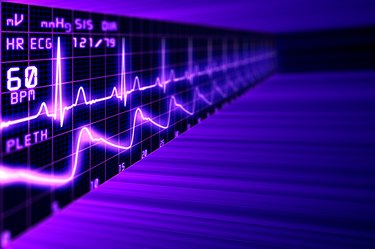
The human heart is a complex electrical organ with its own switch-like pacemaker and "wiring." Your heart rate is influenced by a variety of factors, including impulses from your nervous system and alterations in the levels of electrolytes, such as potassium and magnesium, in your heart's cells. Supraventricular tachycardia, or SVT, is a term physicians use to describe a faster-than-normal firing of electrical centers in the upper chambers of your heart. This prompts an increase in your heartbeat, sometimes to levels that stress your heart. SVT usually occurs in people who already have electrical anomalies in their heart, but it can be aggravated by abnormal serum levels of potassium or magnesium.
Ion Flux
Video of the Day
Under normal circumstances, your heart's rhythm is controlled by a group of electrically-active cells – the sinus node – in the right upper chamber of your heart. This so-called pacemaker discharges about once every second and sends an impulse to the remainder of your heart, prompting organized muscular contraction throughout the entire organ. The sinus node's ability to discharge and recharge every second throughout your life is largely dependent on a controlled flux of potassium ions across the membranes of the sinus node's cells. Calcium and magnesium also play pivotal roles in normal sinus node function.
Video of the Day
Electrical Hierarchy
Every cell in your heart is capable of discharging and initiating a heartbeat, but if each cell became its own pacemaker, this would lead to electrical disorganization that would interfere with your heart's pumping ability. This biological "short circuiting" is usually prevented by the sinus node's overarching control of the other cells in your heart. In SVT, however, certain centers outside your sinus node begin independently discharging at a rapid rate, thus overriding the sinus node's command of your heartbeat. These rebellious centers can become more "irritable," and thus more likely to discharge if your potassium and magnesium levels are abnormal.
Low Levels
Alcoholism is a condition that often leads to depletion of your body's stores of magnesium and potassium. A review in the December 1994 issue of "British Heart Journal" described the mechanism behind the rapid heart rate that frequently accompanies alcohol withdrawal in hospitalized patients: Low serum magnesium and potassium levels combine with heightened nervous system stimulation to trigger tachycardia in these individuals. SVT can also be seen in people with Bartter syndrome, a kidney disease that leads to loss of potassium and magnesium.
High Levels
While abnormally high levels of potassium – hyperkalemia – can cause palpitations, this condition is usually asymptomatic until your potassium reaches levels that are toxic to your heart. At that point, abnormal rhythms other than SVT are usually seen, although SVT is an occasional result of hyperkalemia. In 2005, physicians at Turkey's Adana Teaching and Medical Research Center reported the case of a newborn whose recurrent bouts of SVT were attributed to hyperkalemia. Excessively high serum magnesium levels – hypermagnesemia – are usually only seen in people with kidney failure. As with hyperkalemia, SVT is not the usual rhythm abnormality seen in cases of hypermagnesemia.
Considerations
Normal cardiac activity depends on a proper balance of electrically charged ions, such as potassium and magnesium, in your cells and body fluids. Disruptions in electrolyte concentrations can lead to a variety of heart rhythm disturbances, including SVT. Although changes in serum concentrations of magnesium and potassium can trigger SVT in people with pre-existing heart irritability, SVT is not a common manifestation of either high or low blood levels of magnesium or potassium in otherwise healthy individuals. If you experience intermittent bouts of SVT, ask your doctor if you should take more magnesium or potassium.
- “British Heart Journal”; Influence of Increased Adrenergic Activity and Magnesium Depletion on Cardiac Rhythm in Alcohol Withdrawal; H. Denison, et al.; December 1994
- “British Heart Journal”; Electrocardiographic Findings and Frequency of Arrhythmias in Bartter’s Syndrome; C. Blomström-Lundqvist, et al.; March 1989
- “Pediatric Cardiology”; Recurrent Supraventricular Tachycardia in a Newborn Treated with Amiodarone: Is Hyperkalemia the Apparent Cause?; S.V. Yildirim, et al.; Nov-Dec 2005